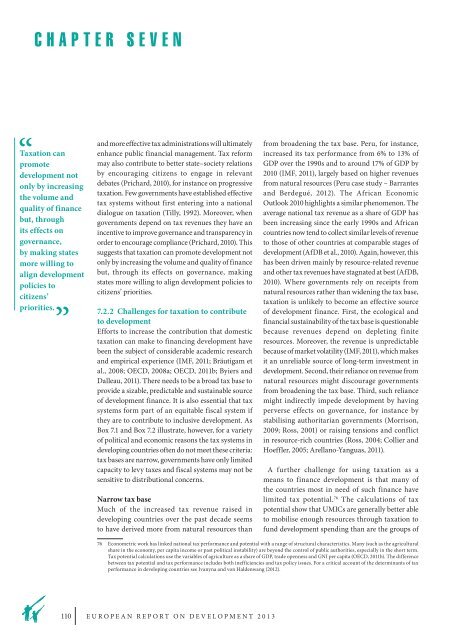Post 2015: Global Action for an Inclusive and Sustainable Future
Post 2015: Global Action for an Inclusive and Sustainable Future
Post 2015: Global Action for an Inclusive and Sustainable Future
Create successful ePaper yourself
Turn your PDF publications into a flip-book with our unique Google optimized e-Paper software.
CHApTER SEvEn<br />
Taxation c<strong>an</strong><br />
promote<br />
development not<br />
only by increasing<br />
the volume <strong>an</strong>d<br />
quality of fin<strong>an</strong>ce<br />
but, through<br />
its effects on<br />
govern<strong>an</strong>ce,<br />
by making states<br />
more willing to<br />
align development<br />
policies to<br />
citizens’<br />
priorities.<br />
110<br />
<strong>an</strong>d more effective tax administrations will ultimately<br />
enh<strong>an</strong>ce public fin<strong>an</strong>cial m<strong>an</strong>agement. tax re<strong>for</strong>m<br />
may also contribute to better state–society relations<br />
by encouraging citizens to engage in relev<strong>an</strong>t<br />
debates (prichard, 2010), <strong>for</strong> inst<strong>an</strong>ce on progressive<br />
taxation. Few governments have established effective<br />
tax systems without first entering into a national<br />
dialogue on taxation (tilly, 1992). moreover, when<br />
governments depend on tax revenues they have <strong>an</strong><br />
incentive to improve govern<strong>an</strong>ce <strong>an</strong>d tr<strong>an</strong>sparency in<br />
order to encourage compli<strong>an</strong>ce (prichard, 2010). this<br />
suggests that taxation c<strong>an</strong> promote development not<br />
only by increasing the volume <strong>an</strong>d quality of fin<strong>an</strong>ce<br />
but, through its effects on govern<strong>an</strong>ce, making<br />
states more willing to align development policies to<br />
citizens’ priorities.<br />
7.2.2 Challenges <strong>for</strong> taxation to contribute<br />
to development<br />
Ef<strong>for</strong>ts to increase the contribution that domestic<br />
taxation c<strong>an</strong> make to fin<strong>an</strong>cing development have<br />
been the subject of considerable academic research<br />
<strong>an</strong>d empirical experience (ImF, 2011; bräutigam et<br />
al., 2008; oEcD, 2008a; oEcD, 2011b; byiers <strong>an</strong>d<br />
Dalleau, 2011). there needs to be a broad tax base to<br />
provide a sizable, predictable <strong>an</strong>d sustainable source<br />
of development fin<strong>an</strong>ce. It is also essential that tax<br />
systems <strong>for</strong>m part of <strong>an</strong> equitable fiscal system if<br />
they are to contribute to inclusive development. as<br />
box 7.1 <strong>an</strong>d box 7.2 illustrate, however, <strong>for</strong> a variety<br />
of political <strong>an</strong>d economic reasons the tax systems in<br />
developing countries often do not meet these criteria:<br />
tax bases are narrow, governments have only limited<br />
capacity to levy taxes <strong>an</strong>d fiscal systems may not be<br />
sensitive to distributional concerns.<br />
Narrow tax base<br />
much of the increased tax revenue raised in<br />
developing countries over the past decade seems<br />
to have derived more from natural resources th<strong>an</strong><br />
EuropE<strong>an</strong> rEport on DEvElopmEnt 2013<br />
from broadening the tax base. peru, <strong>for</strong> inst<strong>an</strong>ce,<br />
increased its tax per<strong>for</strong>m<strong>an</strong>ce from 6% to 13% of<br />
GDp over the 1990s <strong>an</strong>d to around 17% of GDp by<br />
2010 (ImF, 2011), largely based on higher revenues<br />
from natural resources (peru case study – barr<strong>an</strong>tes<br />
<strong>an</strong>d berdegué, 2012). the afric<strong>an</strong> Economic<br />
outlook 2010 highlights a similar phenomenon. the<br />
average national tax revenue as a share of GDp has<br />
been increasing since the early 1990s <strong>an</strong>d afric<strong>an</strong><br />
countries now tend to collect similar levels of revenue<br />
to those of other countries at comparable stages of<br />
development (afDb et al., 2010). again, however, this<br />
has been driven mainly by resource-related revenue<br />
<strong>an</strong>d other tax revenues have stagnated at best (afDb,<br />
2010). Where governments rely on receipts from<br />
natural resources rather th<strong>an</strong> widening the tax base,<br />
taxation is unlikely to become <strong>an</strong> effective source<br />
of development fin<strong>an</strong>ce. First, the ecological <strong>an</strong>d<br />
fin<strong>an</strong>cial sustainability of the tax base is questionable<br />
because revenues depend on depleting finite<br />
resources. moreover, the revenue is unpredictable<br />
because of market volatility (ImF, 2011), which makes<br />
it <strong>an</strong> unreliable source of long-term investment in<br />
development. Second, their reli<strong>an</strong>ce on revenue from<br />
natural resources might discourage governments<br />
from broadening the tax base. third, such reli<strong>an</strong>ce<br />
might indirectly impede development by having<br />
perverse effects on govern<strong>an</strong>ce, <strong>for</strong> inst<strong>an</strong>ce by<br />
stabilising authoritari<strong>an</strong> governments (morrison,<br />
2009; ross, 2001) or raising tensions <strong>an</strong>d conflict<br />
in resource-rich countries (ross, 2004; collier <strong>an</strong>d<br />
Hoeffler, 2005; arell<strong>an</strong>o-Y<strong>an</strong>guas, 2011).<br />
a further challenge <strong>for</strong> using taxation as a<br />
me<strong>an</strong>s to fin<strong>an</strong>ce development is that m<strong>an</strong>y of<br />
the countries most in need of such fin<strong>an</strong>ce have<br />
limited tax potential. 76 the calculations of tax<br />
potential show that umIcs are generally better able<br />
to mobilise enough resources through taxation to<br />
fund development spending th<strong>an</strong> are the groups of<br />
76 Econometric work has linked national tax per<strong>for</strong>m<strong>an</strong>ce <strong>an</strong>d potential with a r<strong>an</strong>ge of structural characteristics. m<strong>an</strong>y (such as the agricultural<br />
share in the economy, per capita income or past political instability) are beyond the control of public authorities, especially in the short term.<br />
tax potential calculations use the variables of agriculture as a share of GDp, trade openness <strong>an</strong>d GnI per capita (oEcD, 2011b). the difference<br />
between tax potential <strong>an</strong>d tax per<strong>for</strong>m<strong>an</strong>ce includes both inefficiencies <strong>an</strong>d tax policy issues. For a critical account of the determin<strong>an</strong>ts of tax<br />
per<strong>for</strong>m<strong>an</strong>ce in developing countries see Iv<strong>an</strong>yna <strong>an</strong>d von Haldenw<strong>an</strong>g (2012).

















